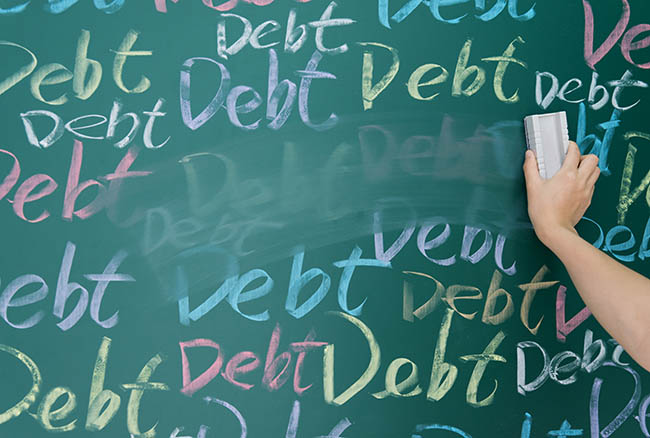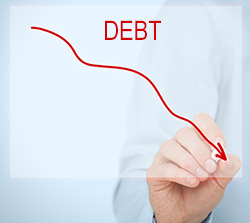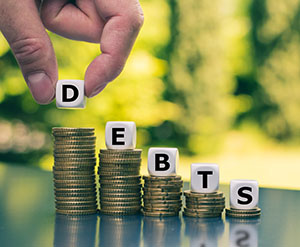How to Reduce Debt – Debt Elimination
For most of us, debt is a way of life. It becomes a burden only when income drops and we are unable to keep the debt under control. That’s when we start thinking about debt reduction options. There are two primary types of debt reduction and counseling programs that can lead to debt elimination. Consumer credit counseling is one option, and debt settlement is another. It is possible for individuals with bad credit to take part in many of these services as they are designed to provide debt reduction services and even debt elimination for those experiencing financial difficulties. Check out some of the debt elimination programs and debt relief options that you may be able to benefit from below.

Debt Relief Options & Debt Reduction Strategies
There are a number of debt elimination programs which can help you regain control of your finances. Below, a few of these debt relief strategies are discussed in more detail.
Reduce Debt with a Debt Management Plan
Based on your financial needs and current debt, our financial specialists may recommend enrolling in a debt management plan (DMP). Many of our clients that were enrolled in a financial debt management strategy were able to become free of debt within 5 years or less. This type of debt relief strategy focuses on paying off credit card debt first and does not offer debt reduction for those looking to pay less than what they owe.
A DMP can enable you to completely pay off unsecured financial debts, often with a reduced interest rate or with fees waived, but not a reduction in the total debt owed. You make a single payment each month to your credit counseling agency which then disperses it amongst the financial institutions that you owe to. Debt relief specialists and credit card debt reduction services have historically held arrangements in place to help financial debt administration customers.
For the most part, all of your credit card accounts are closed & you’ll need to live without them until you complete the repayment strategy. Missing any payments with this form of debt relief can knock you out of the debt elimination program.
Unlike debt consolidation, this form of debt reduction service does not require you to take on any new debt. Debt management plans do not directly influence your credit scores in a negative way, but closing any credit card accounts can harm your credit profile. So, this form of debt reduction can be less damaging to your credit score compared to others as well.
Debt Settlement Debt Reduction Services
 Debt settlement is another solution that may offer a significant reduction in the total amount of debt that must be repaid. With this form of debt elimination, each financial institution that you have borrowed from is approached on your behalf in hopes that a settlement amount can be reached that is much less than the total sum, offering a debt reduction of up to 50% in some cases. Since lenders have much more trouble receiving any payment if an account defaults, they are willing to settle for less than the amount owed & agree not to pursue you about the debt again.
Debt settlement is another solution that may offer a significant reduction in the total amount of debt that must be repaid. With this form of debt elimination, each financial institution that you have borrowed from is approached on your behalf in hopes that a settlement amount can be reached that is much less than the total sum, offering a debt reduction of up to 50% in some cases. Since lenders have much more trouble receiving any payment if an account defaults, they are willing to settle for less than the amount owed & agree not to pursue you about the debt again.
This type of debt reduction process often takes a minimum of 4 to 6 months before a settlement is reached, and in the meantime, not paying your bills can lead to collections calls, penalty fees & even lawsuits. Additionally, you will also be responsible for paying income taxes on the amount of debt forgiven as it is counted as revenue by the IRS.
In regards to how debt settlement affects your credit score, a debt management plan or credit counseling will also leave your profile in better condition. But despite the potential downsides, settlement can reduce the total debt owed by upwards of 30-50%, so it is often a very viable, if not the best, option for achieving a significant debt reduction and help to eliminate debt in a timely manner.
Contact a debt settlement specialist at New Era Debt Solutions today.
Debt Reduction Through Bankruptcy
Bankruptcy is another route of debt elimination that can offer a massive debt reduction or eliminate debt altogether. Although it can do significant damage to your borrowing ability for years to come, bankruptcy can be an effective debt reduction option for those who are unable to reduce their debt through other means.
Chapter 7 bankruptcy is the most common type of personal bankruptcy and it can offer a huge debt reduction in exchange for damaging your credit history for years to come. It can eliminate debt from credit cards, unsecured loans as well as debt accrued from medical costs. It can be performed in 3 or 4 months if you qualify. Other important things to know about filing personal bankruptcy:
- Not all debts can be reduced through bankruptcy – It cannot forgive tax debt or debt from child support obligations.
- Student loan debt is also unlikely to be forgiven by most forms of bankruptcy.
- You cannot submit another Chapter 7 personal bankruptcy for at least eight years.
- Not every individual with a large sum of debt qualifies for bankruptcy. If you earn more than the average for your state as well as family size, or you have a home you intend to save from repossession, you might need to file for Phase 13 bankruptcy instead.
- Even though it may only stay on your credit history for a few years, bankruptcy is a unique type of debt reduction that many credit applications ask if you’ve ever filed for. Lying or trying to hide that you’ve filed for bankruptcy at any point in the past can lead to a fraud charge.
Bankruptcy will destroy your credit rating and also remain on your credit record for up to one decade, even as you restore your credit report. That’s no small issue because poor credit history can impact your future job eligibility, your chances of being approved for a mortgage loan, as well as your rates for vehicle insurance coverage. On the flip side, if your credit rating is already bad, a personal bankruptcy may reduce your debt enough to enable you to restore your credit rating rather than attempting to pay back everything that is owed.
Chapter 7 bankruptcy is likely not the right choice for debt relief if you’re “judgment proof,” which suggests that you don’t have any type of income or building a financial institution can go after. The lenders can still sue you and obtain a judgment, yet they will have nothing to collect on.
 It may also not be the right debt elimination choice if you have property that you wish to keep, but the regulations differ by state. Commonly, specific types of residential property are excluded from being repossessed by personal bankruptcy. This can include possessions such as the primary mode of transportation or the value of the equity in your house, but you will typically have to surrender a 2nd automobile or truck, family treasures, vacation homes and any kind of beneficial collections.
It may also not be the right debt elimination choice if you have property that you wish to keep, but the regulations differ by state. Commonly, specific types of residential property are excluded from being repossessed by personal bankruptcy. This can include possessions such as the primary mode of transportation or the value of the equity in your house, but you will typically have to surrender a 2nd automobile or truck, family treasures, vacation homes and any kind of beneficial collections.
Chapter 13 is a 3 or 5-year court-approved repayment plan which is built around your current revenue & debts. Individuals who are able to stick with the repayment plan until the end have their remaining unsecured debt released in return. It will take longer than a Chapter 7, but if you have the ability to stay up to date with payments, which most individuals do not, you will get to keep your residential property and enjoy a significant debt reduction at the same time. A Chapter 13 remains on your credit scores report for seven years from the filing day.
What to Avoid When Looking for Debt Reduction Services
Debt can come about with a running speed; a wellness crisis, joblessness or a natural disaster. Despite how overwhelming it can be to owe a large sum of debt; these are things that you should avoid while you’re in the process of searching through debt reduction options:
- Do not pay a secured debt (such as a car or mortgage payment) late in order to pay an unsecured one (such as a medical or credit card bill). You can lose the security that secures that financial debt (your car or your house).
- Do not reduce debt by borrowing against the equity in your house. You’re placing your house at risk of repossession and you may be turning unsecured debt and can be eliminated through personal bankruptcy into secured debt that cannot be erased so easily.
- Don’t take out money from your retirement savings in order to repay unsecured debt. This is like hitting the monetary self-destruct button.
- Avoid drawing funds from your pension account (401k) to pay for unsecured debts. If you happen to lose your job, these loans can bring about tax obligation expenses, which is the last thing you need when looking to reduce your debt.
- Do not make decisions based upon which collectors are making the most noise. Rather, take some time to investigate your debt reduction service alternatives and pick one that will be the most effective for eliminating debt in your financial situation.
What does Debt Reduction Mean?
Have you ever been in debt and always wondered how to get out of it? You are not alone since there are millions of other people who want to get out of debt, but they just don’t know how. You may even be one of those who plan on paying off their debts as soon as possible, yet you keep putting it off, resulting in no change and a bigger headache. Many Americans know this feeling all too well.
If you feel the same way, you’re not alone. Learn exactly what debt reduction means before moving forward with it.
When you hear the term debt reduction, it simply means to reduce the debt you owe. This can be done in several ways, such as making more money, cutting expenses, or finding a tailored debt reduction solution. This may mean that you end up consolidating your debts into one loan with a lower interest rate and one set payment. The goal is to pay off your debt so you can move on with your life, be stress free and not end up in the same situation again.
How does Debt Reduction Work?
When you owe money to creditors, you have what is called debt. To reduce the debt you owe, you can actually do a few things that may help. You may be able to negotiate with your creditors to lower your interest rates and/or monthly payments or even consolidate your debts into one loan with a lower interest rate. Of course, you can also work on increasing your income so that you can make more payments each month and pay off your debt in a quicker span of time. If you struggle to pay your debts, talk to a debt reduction expert about options for handling this issue. Debt reduction does not happen overnight, but it may be possible for you to free yourself from the financial burden in due time.
Why Should I Use a Debt Reduction Program?
A debt reduction program can be an effective way to help manage and pay off your debts. Below are a few reasons why you might want to consider using a debt reduction / debt elimination program:
- Lower Interest Rates. Many debt reduction programs negotiate with creditors on your behalf to lower your interest rates. This can help you save money on interest payments over time, which will then help pay off your debts faster with the extra money left over.
- Simplified Payments. If you have multiple debts with different creditors, a debt reduction program can help you consolidate your debts into a single monthly payment. This can make it easier to manage your debts, cut out the annual credit card membership fees, and avoid missed payments or late fees.
- Expert Guidance. Debt reduction programs often provide expert guidance on managing your finances and developing a repayment plan. This can be especially helpful if you’re struggling to make ends meet or don’t know where to start.
- Debt Forgiveness. In some cases, a debt reduction program may be able to negotiate with your creditors to forgive a portion of your debt. While this is not guaranteed, it can be a significant relief if it does happen.
A debt reduction program can help you take control of your finances, reduce your debt, and ultimately achieve financial freedom. Eliminate the debt through a debt reduction plan and program.
Find Effective Debt Reduction Services Available at New Era Debt Solutions
The best debt reduction services and debt elimination options for a swift recovery will depend on your overall financial situation. If you’re looking for help figuring out which method of reducing or eliminating debt is best for your needs, contact a financial expert at New Era Debt Solutions. Our firm has helped settle over $275,000,000 in debt since 1999 and we are available to help you today. Give us a call at (805) 527-4421.
